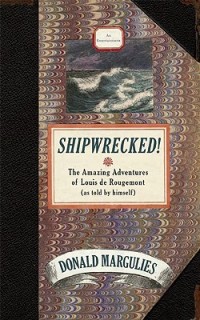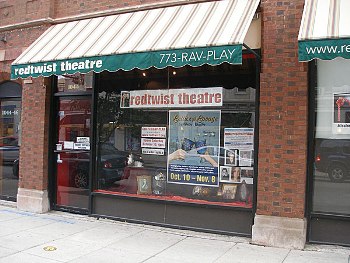Theater 2013-14: Redtwist bundles premieres and extends hand to young actors, directors
 14th in a series of season previews: Along with a pair of iconic plays, Redtwist plans ambitious new off-night and late-night projects that will provide opportunities for recent theater school grads.
14th in a series of season previews: Along with a pair of iconic plays, Redtwist plans ambitious new off-night and late-night projects that will provide opportunities for recent theater school grads.
By Lawrence B. Johnson
What Redtwist Theatre artistic director Michael Colucci calls “the storefront premiere” of Bruce Norris’ “Clybourne Park” and the world premiere of ensemble member Tommy Lee Johnston’s “Geezers” will bookend the company’s 2013-14 season.
 “Clybourne Park,” which Norris spun off Lorraine Hansberry’s “A Raisin in the Sun,” confronts racial issues as they unfold in a fictional Chicago neighborhood over a period of 50 years. The play captured both the 2011 Pulitzer Prize for Drama and the 2012 Tony Award for Best Play. Equally eminent in the Redtwist lineup is British playwright John Osborne’s “Look Back in Anger” (1956), the story of a bitter man in post-World War II England who rages against a society in which he feels marginalized. (Here’s a scene from the 1959 film starring Richard Burton.)
“Clybourne Park,” which Norris spun off Lorraine Hansberry’s “A Raisin in the Sun,” confronts racial issues as they unfold in a fictional Chicago neighborhood over a period of 50 years. The play captured both the 2011 Pulitzer Prize for Drama and the 2012 Tony Award for Best Play. Equally eminent in the Redtwist lineup is British playwright John Osborne’s “Look Back in Anger” (1956), the story of a bitter man in post-World War II England who rages against a society in which he feels marginalized. (Here’s a scene from the 1959 film starring Richard Burton.)
Redtwist also will embark on a two-fold expansion program designed to create new opportunities for directors and actors just out of theater school while at the same time nurturing a younger audience for productions at its intimate venue in the Edgewater neighborhood.
 One project, dubbed More Red, will spotlight recent grads from schools like Northwestern, DePaul and Roosevelt Universities, directing and acting in full-length plays to be performed when Redtwist’s prime-time shows are dark – Saturday afternoons and Sunday and Monday nights.
One project, dubbed More Red, will spotlight recent grads from schools like Northwestern, DePaul and Roosevelt Universities, directing and acting in full-length plays to be performed when Redtwist’s prime-time shows are dark – Saturday afternoons and Sunday and Monday nights.
The second new venture, Deep Red, is a season-long series of five late-night shows all written by Redtwist ensemble member Scott Woldman (at right).
“We’re really emulating the great work (artistic director) Martha Lavey has done at Steppenwolf in creating opportunities for aspiring young theater professionals as well as store-front theaters,” says Michael Colucci. “There are good young actors and directors who haven’t had a lot of chances to work.”
The 2013-14 season in brief:
 “Clybourne Park” by Bruce Norris (Oct. 5-Nov. 10): The story opens in 1959 as fearful residents of an all-white community try to persuade a middle-aged homeowner to cancel the sale of his house to a black couple. The second act fast-forwards to 2009: A young white couple have just bought the same house in a neighborhood that’s now all black – and a black couple are determined to protect the neighborhood’s half-century tradition from plans to raze the house and build a larger one in its place. “We’re happy to have the storefront premiere,” says Colucci. “Bruce Norris approved it himself. We did his ‘Purple Heart’ last season and he’s a big fan of (Goodman Theatre associate producer) Steve Scott, who will direct. It’s an explosive piece of drama, which we think will only be enhanced in our intimate space. ‘Clybourne Park’ doesn’t let anybody off the hook. We’re all guilty of intolerance and racism, and we have to come to grips with it.”
“Clybourne Park” by Bruce Norris (Oct. 5-Nov. 10): The story opens in 1959 as fearful residents of an all-white community try to persuade a middle-aged homeowner to cancel the sale of his house to a black couple. The second act fast-forwards to 2009: A young white couple have just bought the same house in a neighborhood that’s now all black – and a black couple are determined to protect the neighborhood’s half-century tradition from plans to raze the house and build a larger one in its place. “We’re happy to have the storefront premiere,” says Colucci. “Bruce Norris approved it himself. We did his ‘Purple Heart’ last season and he’s a big fan of (Goodman Theatre associate producer) Steve Scott, who will direct. It’s an explosive piece of drama, which we think will only be enhanced in our intimate space. ‘Clybourne Park’ doesn’t let anybody off the hook. We’re all guilty of intolerance and racism, and we have to come to grips with it.” “Elemeno Pea” by Molly Smith Metzler (Chicago premiere, Dec. 5-29): This satiric comedy, about money and class in post-modern America, had its premiere in 2011 at the Louisville Humana Festival of New Plays. “Elemeno Pea” – which takes its title from the sing-song recitation kids use to learn the alphabet — turns the spotlight on two sisters whose lives have gone different directions. Devon, from Buffalo, is a re-routed social worker hustling tables at an Olive Garden. When she pays a visit to her sister, who works for a rich dame on Martha’s Vineyard, the sisters’ divergent values crash head-on. Planted among the wealthy and well-paid herself, the sister in service thinks the world is her oyster – but the Buffalo gal thinks her sibling has sold her soul.
“Elemeno Pea” by Molly Smith Metzler (Chicago premiere, Dec. 5-29): This satiric comedy, about money and class in post-modern America, had its premiere in 2011 at the Louisville Humana Festival of New Plays. “Elemeno Pea” – which takes its title from the sing-song recitation kids use to learn the alphabet — turns the spotlight on two sisters whose lives have gone different directions. Devon, from Buffalo, is a re-routed social worker hustling tables at an Olive Garden. When she pays a visit to her sister, who works for a rich dame on Martha’s Vineyard, the sisters’ divergent values crash head-on. Planted among the wealthy and well-paid herself, the sister in service thinks the world is her oyster – but the Buffalo gal thinks her sibling has sold her soul. “Happy” by Robert Caisley (Chicago premiere, Feb. 15-March 16, 2014): The title is ironic, the play satirical in this modern comedy of manners. Fortysomething Alfred pays a social visit to his best friend, sixtysomething Eduardo, only to be greeted by Eduardo’s gorgeous new live-in companion, twentysomething Eva. Everybody, including Alfred’s late-arriving wife, seems to be reveling in life – happy. Except, that is, for beautiful, young Eva, who’s miserable, and proceeds to poke holes in everyone else’s illusions of bliss. “For Eva, the glass is always half empty,” says Colucci. “She’s just one of those people for whom life’s a bitch, and then you die. So she pushes and prods everyone around her until they all confess their miseries.”
“Happy” by Robert Caisley (Chicago premiere, Feb. 15-March 16, 2014): The title is ironic, the play satirical in this modern comedy of manners. Fortysomething Alfred pays a social visit to his best friend, sixtysomething Eduardo, only to be greeted by Eduardo’s gorgeous new live-in companion, twentysomething Eva. Everybody, including Alfred’s late-arriving wife, seems to be reveling in life – happy. Except, that is, for beautiful, young Eva, who’s miserable, and proceeds to poke holes in everyone else’s illusions of bliss. “For Eva, the glass is always half empty,” says Colucci. “She’s just one of those people for whom life’s a bitch, and then you die. So she pushes and prods everyone around her until they all confess their miseries.” “Look Back in Anger” by John Osborne (May 17-June 15, 2014): Widely regarded as the post-World War II play that changed the landscape of British theater, “Look Back in Anger” (1956) is the story of Jimmy Porter, a bright, educated young man of working-class roots who rails ceaselessly against the social structure and its vestiges of Edwardian hierarchy. His raillery against the unfairness of the world, and his general contempt for society, become focused on his wife Alison, a woman from better social station than his who has settled for a life of squalor with him. Jimmy goes from bad to worse, perhaps unrepentant to the end – if not unredeemed. “It was ground-breaking in its honesty, emotional longing and disaffection,” says Colucci. “Jimmy is an outspoken, belligerent, dissatisfied, alienated man in what was supposed to be a prosperous post-war generation. The ultra-realism resonates of our own divided society of haves and have-nots in America.”
“Look Back in Anger” by John Osborne (May 17-June 15, 2014): Widely regarded as the post-World War II play that changed the landscape of British theater, “Look Back in Anger” (1956) is the story of Jimmy Porter, a bright, educated young man of working-class roots who rails ceaselessly against the social structure and its vestiges of Edwardian hierarchy. His raillery against the unfairness of the world, and his general contempt for society, become focused on his wife Alison, a woman from better social station than his who has settled for a life of squalor with him. Jimmy goes from bad to worse, perhaps unrepentant to the end – if not unredeemed. “It was ground-breaking in its honesty, emotional longing and disaffection,” says Colucci. “Jimmy is an outspoken, belligerent, dissatisfied, alienated man in what was supposed to be a prosperous post-war generation. The ultra-realism resonates of our own divided society of haves and have-nots in America.” “Geezers” by Tommy Lee Johnston (world premiere, July 26-Aug. 24, 2014): Into the midst of seniors at a retirement home comes Jack, 30 years old and pathologically shy. He’s there to begin a new job helping the residents with their daily needs. But it’s the geezers who end up helping Jack break out of his shell in this play about growth and wisdom, learning and loving, life and death. “This young man, who has grown up caring for his deaf and dumb parents, has never been socialized,” says Colucci. “It’s a lovely story of older people depicted in a classy and dignified way.” Tommy Lee Johnston is a Redtwist ensemble member whose play “Aura” was Jeff nominated.
“Geezers” by Tommy Lee Johnston (world premiere, July 26-Aug. 24, 2014): Into the midst of seniors at a retirement home comes Jack, 30 years old and pathologically shy. He’s there to begin a new job helping the residents with their daily needs. But it’s the geezers who end up helping Jack break out of his shell in this play about growth and wisdom, learning and loving, life and death. “This young man, who has grown up caring for his deaf and dumb parents, has never been socialized,” says Colucci. “It’s a lovely story of older people depicted in a classy and dignified way.” Tommy Lee Johnston is a Redtwist ensemble member whose play “Aura” was Jeff nominated.
Here’s the lineup for the More Red series:
- “Jack Goes Boating” by Bob Glaudini (Oct. 19-Nov. 25): When a shy young man who has trouble relating to women is introduced to an equally quirky woman, a tortured, sweetly comic romance is on.
 “Shipwrecked!” by Donald Margulies (Dec. 21-Jan. 27, 2014): It’s an old-fashioned sea adventure — with a man-eating octopus and a stretch on a desert island — about a frail boy who signs on with a sea-going ship, determined to see the world.
“Shipwrecked!” by Donald Margulies (Dec. 21-Jan. 27, 2014): It’s an old-fashioned sea adventure — with a man-eating octopus and a stretch on a desert island — about a frail boy who signs on with a sea-going ship, determined to see the world.- “Love and Understanding” by Joe Penhall (March 1-April 7, 2014): The lives of a married couple, two overworked doctors, are sent into a spin when the husband’s knockabout friend shows up uninvited and begins sowing seeds of discontent – that sprout.
- “A Picasso” by Jeffrey Hatcher (May 31-July 7, 2014): In 1941 Paris, the celebrated painter Pablo Picasso has been detained in a cellar by the Germans. A beautiful official of the German cultural ministry serves him an ultimatum: his life in exchange for one of his works. Picasso contrives a counter offer.
- “The Size of the World” by Charles Evered (Aug. 9-Sept. 15, 2014): A young man with big dreams and no particular talents wants to help make the world a better place. Problem is, his own life is in shambles.
The Dark Red series:
New resident playwright Scott Woldman’s “Luv Cycle” of six plays starts with the moment a couple meet, and follows them all the way through their courtship, engagement, break-up, make-up, marriage, family, divorce, dating and remarriage. The plays will each run four weekends, from Aug. 9-Sept. 13, 2014, with curtains at 10:30 p.m. Fridays and Saturdays.
Getting there:
 Redtwist Theatre, which began life in 1994 as Actors Workshop Theatre, moved to its present location, at 1044 W. Bryn Mawr in the Bryn Mawr Historic District of Chicago’s Edgewater neighborhood, in 2002. “We want our patrons to feel they’ve had a unique experience at a Chicago storefront theater,” says Colucci , who notes that the tiny venue’s 40 seats are large, cushioned chairs and that occasionally – as in “Pillowman” during the 2009-10 season – seating capacity gets shrunk to less than 30. “It’s a warm, homey feel.”
Redtwist Theatre, which began life in 1994 as Actors Workshop Theatre, moved to its present location, at 1044 W. Bryn Mawr in the Bryn Mawr Historic District of Chicago’s Edgewater neighborhood, in 2002. “We want our patrons to feel they’ve had a unique experience at a Chicago storefront theater,” says Colucci , who notes that the tiny venue’s 40 seats are large, cushioned chairs and that occasionally – as in “Pillowman” during the 2009-10 season – seating capacity gets shrunk to less than 30. “It’s a warm, homey feel.”
Related Links:
- Official website of Redtwist Theatre: RedtwistTheatre.org
- Review of Lee Blessing’s “Body of Water” at Redtwist: Read it at ChicagoOntheAisle.com
- Review of Bruce Norris’s “Purple Heart” at Redtwist: Read it at ChicagoOntheAisle.com
- Review of Arthur Miller’s “Broken Glass” at Redtwist: Read it at ChicagoOntheAisle.com
- Role Playing: Jacqueline Grandt as a wheelchair-bound wife in “Broken Glass”: Read the interview at ChicagoOntheAisle.com
- Review of Martin McDonagh’s “The Cripple of Inishmaan” at Redtwist: Read it at ChicagoOntheAisle.com
- Role Playing: Baize Buzan as a brash Irish lass in “The Cripple of Inishmaan”: Read the interview at ChicagoOntheAisle.com
Tags: A Picasso, Bob Glaudini, Bruce Norris, Charles Evered, Clybourne Park, Donald Margulies, Elemeno Pea, Geezers, Happy, Jack Goes Boating, Jeffrey Hatcher, Joe Penhall, John Osbourne, Look Back in Anger, Love and Understanding, Michael Colucci, Molly Smith Metzler, Redtwist Theatre, Robert Caisley, Scott Woldman, Shipwrecked, Steve Scott, The Size of the World, Tommy Lee Johnston

